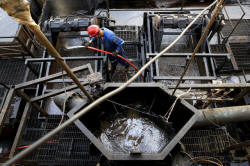|
Saudis pledge not to
shock oil market as OPEC clash looms
 Send a link to a friend
Send a link to a friend
 [June 02, 2016]
By Reem Shamseddine, Rania El Gamal and Alex Lawler [June 02, 2016]
By Reem Shamseddine, Rania El Gamal and Alex Lawler
VIENNA (Reuters) - Saudi Arabia promised on
Thursday not to flood the oil market with extra barrels as OPEC headed
into a heated debate about production policy, with Iran insisting on the
right to raise output steeply.
Tensions between the Sunni-led kingdom and the Shi'ite Islamic Republic
have been the highlights of several previous OPEC meetings, including in
December 2015 when the group failed to agree on a formal output target
for the first time in years.
Several OPEC sources said Saudi Arabia and its Gulf allies would propose
to set a new collective ceiling in an attempt to repair OPEC's waning
importance and end a market-share battle that has sapped prices and cut
investment.
Failure to reach any deal would revive market fears that OPEC's largest
producer Saudi Arabia, already pumping near record highs, may raise
production further to punish rivals and gain additional market share.
"We will be very gentle in our approach and make sure we don't shock the
market in any way," new Saudi Energy Minister Khalid al-Falih told
reporters ahead of the meeting.
"We are going to be responsible but we are also going to be responsive,"
Falih said when asked whether Saudi Arabia could flood the market with
new oil.

Answering a question on whether Riyadh would propose setting a new
collective output ceiling, he said: "We will do that when necessary."
He added that he would listen to anything Iran brings to the table.
Any agreement between Riyadh and Tehran would be seen as a big surprise
by the market, which in the past two years has grown increasingly used
to clashes between the political foes as they fight proxy wars in Syria
and Yemen.
Saudi Arabia effectively scuppered plans for a global production freeze
- aimed at stabilizing oil markets - in April. It said then that it
would join the deal, which would also have involved non-OPEC Russia,
only if Iran agreed to freeze output.
Tehran has been the main stumbling block for the Organization of the
Petroleum Exporting Countries to agree on output policy over the past
year as the country boosted supplies despite calls from other members
for a production freeze.
Tehran argues it should be allowed to raise production to levels seen
before the imposition of now-ended Western sanctions over Iran's nuclear
program.
Iranian Oil Minister Bijan Zanganeh said Tehran would not support any
new collective output ceiling and wanted the debate to focus on
individual country production quotas.
"Without country quotas, OPEC cannot control anything," Zanganeh told
reporters. He insisted Tehran deserved a quota - based on historic
output levels - of 14.5 percent of OPEC's overall production.

OPEC is pumping 32.5 million barrels per day (bpd), which would give
Iran a quota of 4.7 million bpd - well above its current output of 3.8
million, according to Tehran's estimates, and 3.5 million, based on
market estimates.
[to top of second column] |

The flow of drilling mud is seen in a container while an oilfield
worker works on a drilling rig at an oil well operated by
Venezuela's state oil company PDVSA, in the oil rich Orinoco belt,
near Cabrutica at the state of Anzoategui April 16, 2015.
REUTERS/Carlos Garcia Rawlins/File Photo

Zanganeh said he supported a candidate from Nigeria for the post of OPEC
secretary-general, which could emerge as a rare compromise within the
organization if Riyadh also backs the appointment.
COUNTRY QUOTAS
Falih was the first OPEC minister to arrive in Vienna this week, signaling he
takes the organization seriously despite fears among fellow members that Riyadh
is no longer keen to have OPEC set output.
"There could be shorter-term situations in which, in our view, OPEC might
intervene and yet other situations — such as long-term growth of marginal
barrels — in which case it should not," Falih told Argus Media ahead of the
meeting.
At its previous meeting in December 2015, OPEC effectively allowed its 13
members to pump at will.
As a result, prices crashed to $27 per barrel in January, their lowest in over a
decade, but have since recovered to around $50 due to global supply outages.
UAE Oil Minister Suhail bin Mohammed al-Mazroui said low oil prices were pushing
all countries to limit production, whether they say so publicly or not.

Until December 2015, OPEC had a ceiling of 30 million bpd - in place since
December 2011, although it effectively abandoned individual production quotas
years ago.
Any ceiling below 32.5 million bpd would represent an effective cut.
By 1130 GMT (7.30 a.m. ET), ministers had been meeting for 2-1/2 hours in a
closed session.
For a Take-a-Look on Reuters stories on OPEC, click on
(Additional reporting by Shadia Nasralla; Writing by Dmitry Zhdannikov; Editing
by Dale Hudson)
[© 2016 Thomson Reuters. All rights
reserved.] Copyright 2016 Reuters. All rights reserved. This material may not be published,
broadcast, rewritten or redistributed. |